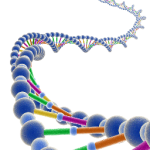 Science allows us to understand more and more about pregnancy, prenatal care, and the developing fetus as time goes on. One commonly misunderstood development in prenatal care is a procedure called non-invasive prenatal genetic testing (NIPT). While this technique has become quite common in recent years, many expectant mothers often have questions before deciding to move forward with type of testing.
Science allows us to understand more and more about pregnancy, prenatal care, and the developing fetus as time goes on. One commonly misunderstood development in prenatal care is a procedure called non-invasive prenatal genetic testing (NIPT). While this technique has become quite common in recent years, many expectant mothers often have questions before deciding to move forward with type of testing.
What is NIPT?
Noninvasive prenatal genetic testing is a screening test that can detect certain chromosomal abnormalities in a fetus including trisomy 21 (Down syndrome), trisomy 18 (Edwards syndrome), and trisomy 13 (Patau syndrome). This simple blood test, which can be administered as early as the ninth week of pregnancy, can also determine if the baby is a boy or girl.
Who is NIPT for?
A common misconception about prenatal genetic testing is that it is only for women who are identified as “at risk.” In fact, there is no need to wait for your doctor to recommend or mention it; any pregnant woman can talk to her doctor to request it.
Is NIPT dangerous?
Many patients incorrectly confuse noninvasive prenatal genetic testing with other, more invasive forms of diagnostic prenatal testing. NIPT involves only a simple blood draw that poses no threat to the mother or the fetus.
What happens if my baby tests positive for a genetic disorder?
A positive or abnormal test result does not guarantee that your child will be born a genetic disorder. If a fetus tests positive for a genetic disorder in the prenatal genetic screening test, a physician will likely recommend additional, more definitive tests in order to make a diagnosis. It is also important to note that a negative result does not guarantee that a child will not be born with a genetic disorder as noninvasive genetic testing is limited in its ability to detect all genetic abnormalities in a fetus.
What is genetic counseling?
A genetic counselor is a medical professional who specializes in the treatment of genetic abnormalities. After a positive test result, parents may be referred to a genetic counselor. In addition to providing emotional support and resources, a genetic counselor can also help families plan for the future care of their baby.
When considering noninvasive genetic testing, it is most important to remember that you are never alone in the process. You can always speak with your doctor or anyone in your maternity care team for support. If you have additional questions or would like to learn more about prenatal genetic testing, make an appointment with a genetic counselor today.
